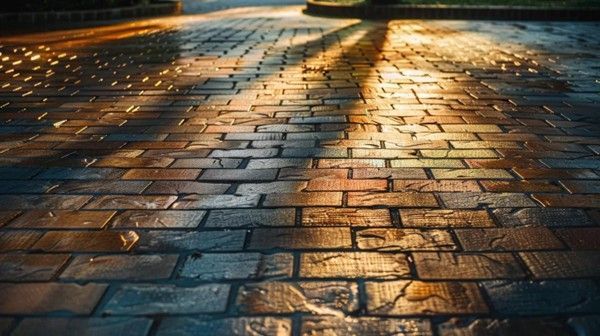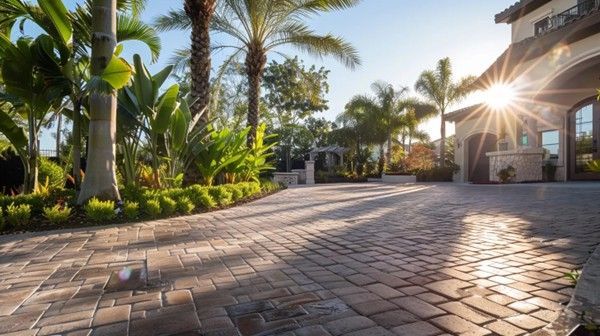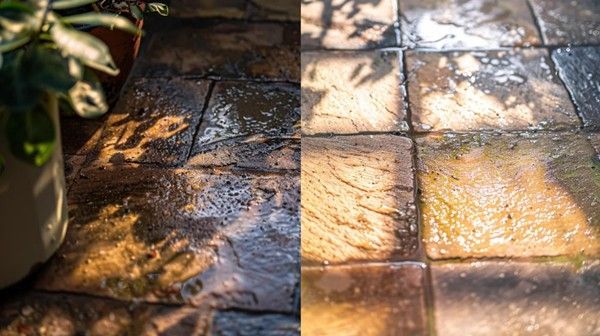Paver Sealing vs. DIY: Which Is Best for Your Patio?
Are you considering sealing your paver patio but unsure if you should hire a professional or tackle it yourself? Paver sealing can protect your concrete surfaces from pressure, weather, and hazards, prolonging their lifespan. This article will compare professional paver sealing services with the DIY approach, outline key benefits, and help you evaluate the best option for your outdoor landscape. By the end, readers will gain insights to make an informed decision that suits their budget and needs.
Key Takeaways
- Regular paver sealing preserves the longevity and appearance of outdoor surfaces
- Professional sealing provides better protection against stains and moisture than DIY methods
- Assessing paver condition helps determine if professional services or DIY is the best choice
- High-quality sealants specifically designed for pavers ensure optimal adhesion and durability
- Homeowners should seal pavers every one to three years based on usage and weather conditions
Understanding Paver Sealing and Its Benefits for Outdoor Areas
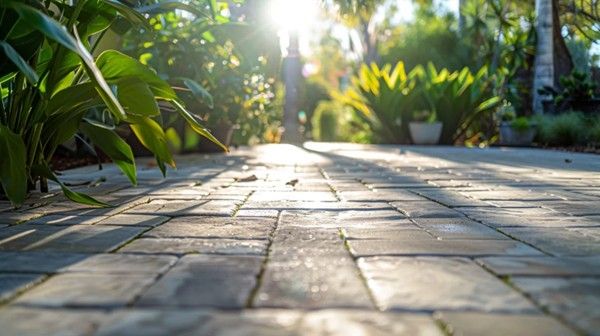
Maintaining paver surfaces is essential to preserve their longevity and appearance. Paver sealing effectively addresses common issues like mildew and stains, ensuring a cleaner and safer outdoor space. A quality sealant enhances the aesthetic appeal of patios and driveways, making them look new. Understanding these benefits guides homeowners in choosing between paver sealing service and DIY solutions.
The Importance of Maintaining Paver Surfaces
Maintaining paver surfaces is vital for preventing moisture-related issues that lead to mold and algae growth. Regular cleaning and sealing keep debris at bay, ensuring the longevity and visual appeal of sealed pavers. Homeowners benefit significantly from proper maintenance, as it not only protects against unsightly stains but also enhances the overall safety of their outdoor areas.
Common Issues That Paver Sealing Addresses
Paver sealing effectively addresses several common issues that homeowners encounter, such as oil stains, mold, and weather-related deterioration. For instance, in regions with varied climates, sealants protect travertine surfaces from moisture and prevent unsightly curb damage. Choosing professional paver sealing services ensures that these concerns are managed with precision, allowing outdoor spaces to maintain their charm and functionality for years to come.
Enhancing Aesthetic Appeal Through Paver Sealing
Paver sealing not only protects surfaces from wear and tear but also enhances the overall beauty of outdoor areas. A high-quality sealant contributes to the longevity of pavers by preventing damage from weather and pollutants, which can detract from the classic look of a patio. For homeowners looking to improve their lawn's appearance, investing in professional paver sealing services can lead to a vibrant, well-maintained outdoor space that stands the test of time:
| Benefit | Description |
|---|---|
| Enhanced Beauty | Sealants restore the color and vibrancy of pavers, making outdoor spaces more visually appealing. |
| Increased Longevity | Proper sealing protects against wear and damage, extending the life of the pavers. |
| Reduced Maintenance | A sealed surface is easier to clean and requires less frequent maintenance. |
Paver sealing can transform outdoor spaces, offering protection and style. Yet, choosing to hire professionals comes with its own set of advantages and drawbacks that every homeowner should consider.
The Pros and Cons of Professional Paver Sealing Services
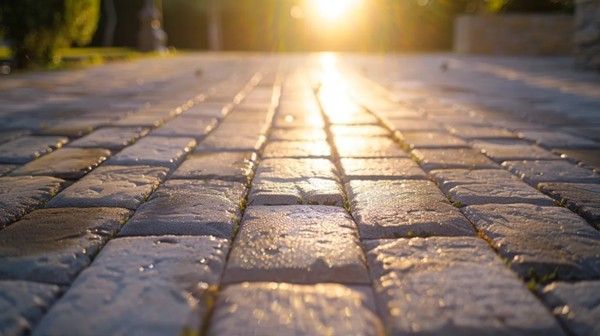
Hiring experts for paver sealing offers numerous advantages, such as enhanced durability and effective protection against water damage, ensuring customer satisfaction. However, potential drawbacks include the costs associated with professional services. This section will provide insight into the benefits and challenges of enlisting professionals for paver sealing, including considerations for environmentally friendly options for walkways and patios.
Benefits of Hiring Experts for Paver Sealing
Hiring experts for paver sealing ensures that all aspects of the hardscape are thoroughly addressed, including the prevention of soil erosion and moss growth that can undermine surfaces over time. Professionals have access to high-quality sealants and equipment, which leads to better protection against moisture and enhances the durability of pavers. Additionally, their knowledge allows them to properly fill in sand joints and apply treatments that will preserve the patio's aesthetic while reducing the risk of future damage.
Potential Drawbacks of Professional Services
While professional paver sealing services offer many advantages, there are potential drawbacks that customers should consider. The costs associated with hiring experts can be significant, especially when they are compared to the more budget-friendly DIY approach. Additionally, if not chosen carefully, the sealants used may not always provide the desired protection against ultraviolet damage, dirt, or environmental wear, leaving homeowners with less pride in their outdoor spaces.
| Drawback | Description |
|---|---|
| Cost | Professional services can be expensive compared to DIY options. |
| Sealant Limitations | Some sealants may not protect effectively against ultraviolet exposure and dirt. |
| Customer Control | Homeowners may feel less control over the selection of materials and processes. |
Cost Considerations for Professional Sealing
When considering paver sealing services, cost plays a significant role in decision-making. Professional sealing can be more costly than a DIY approach, especially when factoring in the price of high-quality sealants and cleaner products that effectively remove stains and protect surfaces, including brick patios and fire pits. However, investing in expert services often results in better protection and longevity, ultimately saving homeowners from expensive repairs or replacements due to damage caused by inadequate sealing methods.
Some may choose the easy path, trusting the experts with their pavers. Others find satisfaction in doing it themselves, ready to roll up their sleeves for a hands-on approach.
The DIY Approach to Paver Sealing
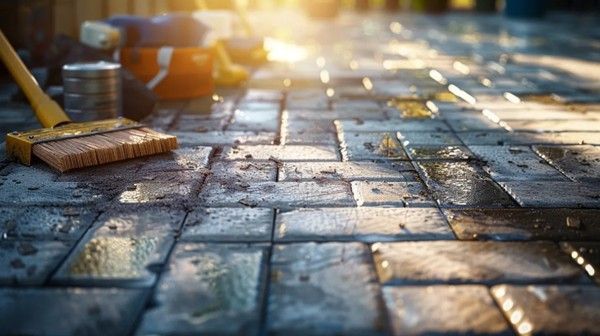
Homeowners considering the DIY approach to paver sealing should be aware of the essential tools and materials required for the task, such as sealants and pressure washing equipment. A step-by-step guide will outline the process of sealing pavers effectively while highlighting common mistakes to avoid, including issues related to efflorescence and improper application techniques. Attention to these details can contribute to a successful sealing experience.
Essential Tools and Materials for DIY Paver Sealing
For homeowners interested in the DIY approach to paver sealing, several essential tools and materials will aid in achieving optimal results. High-quality sealants specifically designed for pavers are crucial, as they provide the necessary protection and enhance the appearance of the surface. Additionally, a pressure washer is an effective tool for cleaning the pavers before applying sealant, ensuring that dirt and grime do not interfere with adhesion.
Step-by-Step Guide to Sealing Pavers Yourself
Sealing pavers as a DIY project involves several essential steps for successful application. First, homeowners should thoroughly clean the paver surface using a pressure washer to remove dirt, grime, and any residues that could hinder sealant adhesion. After allowing the area to dry completely, they can begin applying a high-quality sealant evenly over the pavers, ensuring that all joints are filled properly for optimal protection. This meticulous process not only enhances the visual appeal of the patio but also safeguards it against future damage.
Common Mistakes to Avoid During the DIY Process
When homeowners decide to take on the DIY approach to paver sealing, several common mistakes can undermine their efforts. One significant error is neglecting to clean the paver surface thoroughly before applying sealant, as any dirt or debris can lead to poor adhesion and ultimately affect the longevity of the seal. Another mistake involves applying the sealant too thickly, which can create an uneven surface and diminish the visual appeal of the patio—it's essential to follow the manufacturer's guidelines for application to ensure the best results.
DIY efforts can save money, but they often lack the polish of a professional touch. Next, the focus shifts to the costs involved in choosing between a skilled paver sealing service and taking on the task alone.
Comparing Costs: Professional Paver Sealing vs. DIY
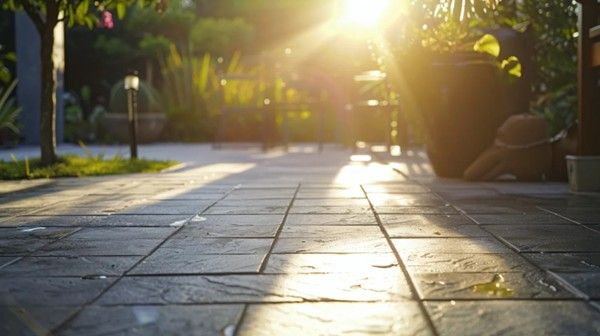
Understanding the costs associated with paver sealing is crucial for homeowners deciding between professional services and DIY approaches. This section highlights the breakdown of expenses for hiring experts, alongside estimated costs for DIY projects. Additionally, it discusses the long-term value each method offers, aiding homeowners in making an informed choice for maintaining their patios.
Breakdown of Expenses for Professional Services
When considering professional paver sealing services, homeowners must account for various expenses that can impact their budget. These costs typically include labor, high-quality sealants, and any necessary cleaning products. On average, the total expense for hiring experts can range significantly based on the size of the patio, condition of the pavers, and the specific service provider, leading to an investment that often pays off in longer-lasting protection and enhanced appearance:
| Expense Type | Estimated Cost |
|---|---|
| Labor Costs | $1 to $2 per square foot |
| Sealant Products | $0.50 to $1.50 per square foot |
| Cleaning Supplies | $50 to $150 (one-time cost) |
Estimated Costs for DIY Paver Sealing Projects
Homeowners interested in the DIY approach for paver sealing should consider various costs involved in this method. Basic expenses typically include purchasing high-quality sealant, which can range from $0.50 to $1.50 per square foot, alongside pressure washing equipment that may require additional investment. Factoring in these materials, the overall cost can be significantly lower than hiring professionals, making this approach budget-friendly for those willing to invest time and effort into maintaining their patios:
| Expense Type | Estimated Cost |
|---|---|
| Sealant Products | $0.50 to $1.50 per square foot |
| Pressure Washer Rental | $40 to $100 (daily rental fee) |
| Cleaning Supplies | $20 to $50 (one-time cost) |
Long-Term Value of Each Approach
When considering the long-term value of paver sealing versus a DIY approach, it is essential to examine the potential outcomes of each option. Professional sealing often results in superior durability and protection against environmental factors, thus extending the life of the patio. On the other hand, while DIY methods may initially appear cost-effective, they can lead to issues like inadequate sealing and quicker deterioration, potentially resulting in higher future repair costs for homeowners.
Every outdoor space tells a story, shaped by choices made along the way. Assessing your area carefully will guide you to the right sealing option, ensuring its beauty lasts.
Evaluating Your Outdoor Space for the Best Sealing Option
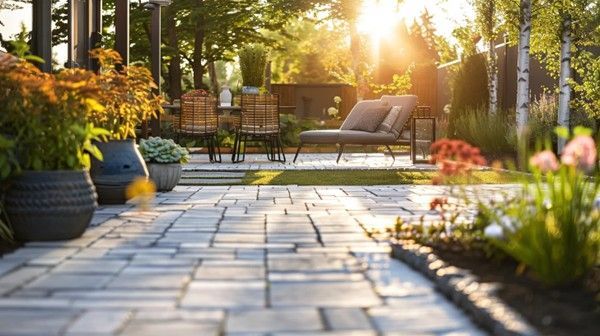
Assessing the condition of pavers is crucial before deciding on sealing options. Homeowners should evaluate their outdoor space's size and complexity to determine feasibility. Personal skill level and comfort with DIY tasks also play a significant role in this decision. Understanding these factors will guide homeowners in making informed choices between professional paver sealing services and self-application techniques.
Assessing Paver Condition Before Sealing
Before deciding between professional paver sealing services and a DIY approach, it is essential to assess the condition of the pavers. Homeowners should look for issues such as cracks, stains, or mold that may indicate a need for restoration prior to sealing. Evaluating these factors will significantly impact the effectiveness of the sealing process and ensure that the chosen method, whether professional or DIY, achieves the desired results.
- Check for visible cracks that may need repair.
- Inspect surfaces for stains and mold growth.
- Evaluate the overall cleanliness and condition of the pavers.
Space Size and Complexity Considerations
When evaluating the space size and complexity of a patio, homeowners must consider how the layout and design influence the sealing process. A large area with intricate designs may require more time and effort to seal correctly, making professional services a more practical choice. Conversely, smaller, simpler patios might be manageable for DIY sealing, allowing homeowners to save on costs while maintaining their outdoor spaces effectively:
- Assess the patio's square footage and layout.
- Identify complex patterns or features that may complicate sealing.
- Evaluate personal confidence and skills in completing the project.
Personal Skill Level and Comfort With DIY Tasks
Assessing personal skill level and comfort with DIY tasks is crucial for homeowners contemplating the sealing of their patios. For those with experience in hands-on projects, a DIY approach might feel manageable and cost-effective. Conversely, individuals who lack the confidence or expertise in applying sealants may prefer to hire professionals to ensure proper application and avoid costly mistakes, such as uneven surfaces or inadequate sealing.
As you assess your outdoor space, questions about sealing options will naturally arise. Next, let's tackle some common queries about paver sealing and the pros and cons of choosing a DIY approach.
FAQs About Paver Sealing and DIY Choices
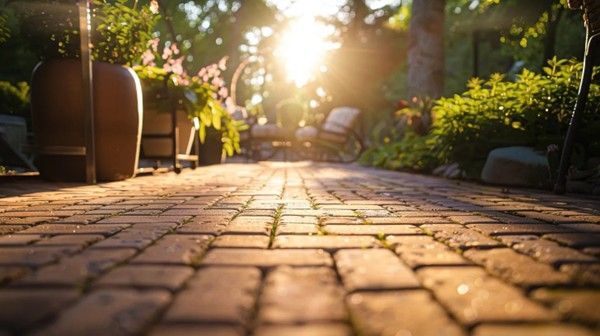
Homeowners often have questions about paver sealing and the DIY approach. Topics such as how often pavers should be sealed and what types of sealers are appropriate are essential for maintaining outdoor spaces. Additionally, evaluating personal skills versus hiring professional services can significantly impact the outcome. These insights will guide homeowners in making informed decisions for their patios.
How Often Should Pavers Be Sealed?
Homeowners should consider sealing their pavers every one to three years, depending on factors such as traffic, weather conditions, and the type of sealant used. Areas with high foot traffic or extreme weather may require more frequent sealing to maintain protection against stains and deterioration. By keeping a regular sealing schedule, they can ensure their patios remain visually appealing and protected from potential damage.
Can I Use Any Sealer for My Pavers?
Using any sealer for pavers is not advisable, as the type of sealant plays a crucial role in the effectiveness of the protection offered. Homeowners should select sealers specifically designed for the material of their pavers, whether they are concrete, brick, or natural stone. Choosing the correct sealant ensures optimal adhesion, durability, and resistance to stains, ultimately preserving the aesthetic appeal and longevity of the patio.
What Should I Consider When Choosing Between DIY and Professional Services?
When deciding between DIY paver sealing and hiring professional services, homeowners should evaluate their skill level, budget, and the condition of their patio. For those with experience in similar projects and confidence in their abilities, a DIY approach may provide cost savings and a sense of accomplishment. However, if the patio has significant damage or complex design features, opting for a professional service ensures the job is done correctly, minimizing the risk of long-term issues and enhancing the appearance of the outdoor space:
- Assess personal skills and experience with sealing projects.
- Consider the overall condition of the pavers before sealing.
- Evaluate the potential costs associated with each approach.
Conclusion
Choosing between professional paver sealing and a DIY approach is crucial for maintaining the beauty and durability of patios. Homeowners must assess their skills, budget, and the condition of their pavers to make an informed decision. Professional services often provide enhanced protection and longevity, while DIY can be cost-effective for simpler projects. Ultimately, understanding the benefits and drawbacks of each option empowers homeowners to secure their outdoor spaces effectively.


